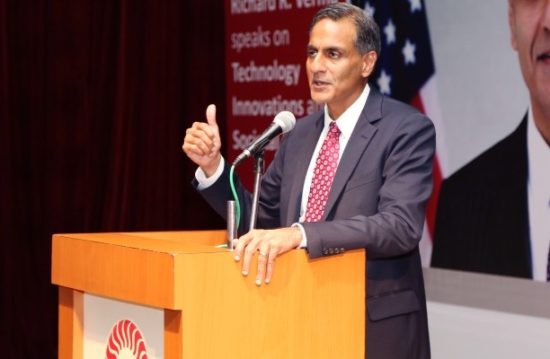Recalling Prime Minister Narendra Modi’s visit to the Silicon Valley where he emphasized on bringing together the best minds of both nations, U.S. Ambassador to India Richard R. Verma has said smart cities must continue to use and benefit from the latest advances in innovation and advanced technologies.

“I had the great privilege to be in Silicon Valley when Prime Minister Modi was there last fall. I heard him speak in several different forums about innovation. He called for bringing together the best minds of India and the United States, who could use the latest advances in science and technology to solve our two countries’ – and the world’s – biggest challenges,” said Verma.
“In short, he encouraged all of us to look at ways to harness our great networks of entrepreneurs and innovators to improve the condition of ordinary people. He said, ‘In this digital age, we have an opportunity to transform the lives of people in ways that were hard to imagine just a couple of decades ago’,” he added.
The U.S. envoy, however, said one can’t think of technology as a panacea and cannot forget that the fundamentals are still essential.
“The trusted relationships that we form, the ability to build consensus, and our ability to hear and understand each other still form the core of our interactions and no device or smart application can substitute for that interaction,” said Verma.
“An app, for example, cannot replace a town hall meeting or eliminate the need for citizens to meet face to face with city and government officials when necessary. Relationships matter. Building trust is imperative. Good governance will continue to be essential,” he added.
Verma, who was speaking at “The Smart Cities Investors Meet”Confederation of Indian Industries here yesterday, said technology can be the accelerator, connector and enabler.
“I’ve seen first-hand what our companies are doing and the good that our technologies and know-how can provide. We are grateful for all of these efforts,” he added.
The U.S. envoy said one must keep in mind that the innovations and technologies don’t always come from the large and well-known companies.
“We have, for example, seen young women from a slum area in Mumbai develop a safety app with a GPS locator and panic function to improve women’s safety; we’ve seen tech innovations from high-schoolers in Chennai who developed an app to help citizens get rid of trash by creating an online marketplace,” said Verma.
“And I’ve seen what many health NGOs have rolled out in terms of digital health to get advanced diagnostics and treatment for those who could not travel to a clinic or hospital,” he added.
Verma said these are just a few of the countless important innovations being developed by young Indians and Americans every day.
“We have to continue to seek-out, support and foster this spirit of innovation in both our countries,” he added.
The U.S. envoy further said 2015 was the highest year of bilateral trade between the US and India, crossing over $107 billion.
“And as our Assistant Secretary of Commerce Arun Kumar reported yesterday, U.S. companies have invested $15 billion in the past 2 years, and will sign deals worth some $27 billion in the next two years,” said Verma.
“And, thanks to a CII report published last year, we know the extent of Indian companies’ investments in the US – also topping $15 billion, with 100 companies spread across 35 states, and employing nearly 100,000 Americans,” he added.
Verma said the United States aims to deepen and broaden that economic and trade relationship across multiple domains.
“And I am excited about potential new announcements that could come in the next few weeks. All of these initiatives have at their root a commitment to improve the economic condition and opportunities for people in both our countries, particularly for those looking to advance up the economic ladder,” said Verma.
“We have been a close partner with the GOI on a wide range of it’s initiatives, but we are particularly excited on our work together on
Smart Cities – an aim to make India’s cities more efficient, cleaner, safer, heathier, greener, and modern,” he added.
The U.S, envoy said the world is undergoing a demographic transition unprecedented in history.
“Urbanization is increasing across the world, including and especially here in India, as more and more people flock to metropolises in search of greater opportunity and a better future.
Technological innovations are transforming society, facilitating greater migration from rural areas,” said Verma.
“Affordable transportation networks enable people to move more easily from rural to urban areas. The spread of cellular networks/advances in communications technology have exposed rural populations to the allure of cities. Changing weather patterns and rising temperatures are affecting economic conditions, prompting flight to cities,” he added.
Smart cities must benefit from latest advances in innovation: U.S. envoy





